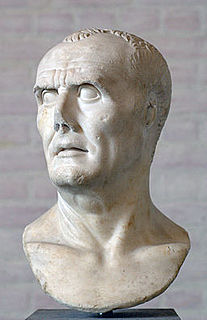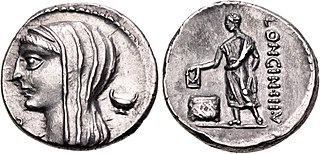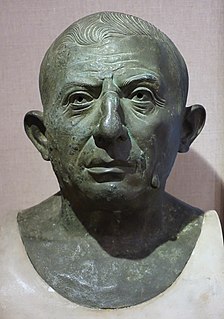Related Research Articles
80s BC is the time period from 89 BC – 80 BC.
This article concerns the period 109 BC – 100 BC.

The First, Second, and Third Samnite Wars were fought between the Roman Republic and the Samnites, who lived on a stretch of the Apennine Mountains to the south of Rome and the north of the Lucanians. The first of these wars was the result of Rome's intervention to rescue the Campanian city of Capua from a Samnite attack. The second one was the result of Rome's intervention in the politics of the city of Naples and developed into a contest over the control of much of central and southern Italy. The third war also involved a struggle over the control of this part of Italy. The wars extended over half a century and the peoples to the east, north, and west of Samnium as well as the peoples of central Italy north of Rome and the Senone Gauls got involved to various degrees and at various points in time. The Samnites were one of early Rome's most formidable rivals.

Lucius Cornelius Scipio Asiagenus, later known as Scipio Asiaticus, was a general and statesman of the Roman Republic. He was the son of Publius Cornelius Scipio and the younger brother of Scipio Africanus. He was elected consul in 190 BC, and later that year led the Roman forces to victory at the Battle of Magnesia.

The gens Valeria was a patrician family at ancient Rome, prominent from the very beginning of the Republic to the latest period of the Empire. Publius Valerius Poplicola was one of the consuls in 509 BC, the year that saw the overthrow of the Tarquins, and the members of his family were among the most celebrated statesmen and generals at the beginning of the Republic. Over the next ten centuries, few gentes produced as many distinguished men, and at every period the name of Valerius was constantly to be found in the lists of annual magistrates, and held in the highest honour. Several of the emperors claimed descent from the Valerii, whose name they bore as part of their official nomenclature.

The Social War, also called the Italian or Marsic War, was waged from 91 to 87 BC between the Roman Republic and other cities and tribes in Italy which had hitherto been allies of Rome for centuries. The Italian allies wanted Roman citizenship, not only for the status and influence that came with it, but also for the right to vote in the Roman Republic. They believed that they should be treated equally to the Romans, given that they had formed cultural and linguistic connections with the Roman civilization, and had been loyal allies for over two centuries. The Romans strongly opposed their demands and refused to grant them citizenship, thus leaving the Italian groups with fewer rights and privileges.

The gens Cassia was a Roman family of great antiquity. The earliest members of this gens appearing in history may have been patrician, but all those appearing in later times were plebeians. The first of the Cassii to obtain the consulship was Spurius Cassius Viscellinus, in 502 BC. He proposed the first agrarian law, for which he was charged with aspiring to make himself king, and put to death by the patrician nobility. The Cassii were amongst the most prominent families of the later Republic, and they frequently held high office, lasting well into imperial times. Among their namesakes are the Via Cassia, the road to Arretium, and the village of Cassianum Hirpinum, originally an estate belonging to one of this family in the country of the Hirpini.
Lucius Manlius Vulso Longus was a Roman patrician, who became consul in 256 and 250 BC. He has been remembered as another militarily successful Roman consul; his military achievements significantly contributed to the victory of the Romans in the First Punic War.

The gens Licinia was a celebrated plebeian family at ancient Rome, which appears from the earliest days of the Republic until imperial times, and which eventually obtained the imperial dignity. The first of the gens to obtain the consulship was Gaius Licinius Calvus Stolo, who, as tribune of the plebs from 376 to 367 BC, prevented the election of any of the annual magistrates, until the patricians acquiesced to the passage of the lex Licinia Sextia, or Licinian Rogations. This law, named for Licinius and his colleague, Lucius Sextius, opened the consulship for the first time to the plebeians. Licinius himself was subsequently elected consul in 364 and 361 BC, and from this time, the Licinii became one of the most illustrious gentes in the Republic.
Lucius Julius Caesar was the name of several men of the gens Julia at ancient Rome. Lucius was one of three praenomina used by the Julii Caesares; the others were Sextus and Gaius, which was the praenomen of the most famous Julius Caesar.

The gens Junia was one of the most celebrated families of ancient Rome. The gens may originally have been patrician, and was already prominent in the last days of the Roman monarchy. Lucius Junius Brutus was the nephew of Lucius Tarquinius Superbus, the seventh and last King of Rome, and on the expulsion of Tarquin in 509 BC, he became one of the first consuls of the Roman Republic.

The gens Cornelia was one of the greatest patrician houses at ancient Rome. For more than seven hundred years, from the early decades of the Republic to the third century AD, the Cornelii produced more eminent statesmen and generals than any other gens. At least seventy-five consuls under the Republic were members of this family, beginning with Servius Cornelius Maluginensis in 485 BC. Together with the Aemilii, Claudii, Fabii, Manlii, and Valerii, the Cornelii were almost certainly numbered among the gentes maiores, the most important and powerful families of Rome, who for centuries dominated the Republican magistracies. All of the major branches of the Cornelian gens were patrician, but there were also plebeian Cornelii, at least some of whom were descended from freedmen.

The gens Calpurnia was a plebeian family at ancient Rome, which first appears in history during the third century BC. The first of the gens to obtain the consulship was Gaius Calpurnius Piso in 180 BC, but from this time their consulships were very frequent, and the family of the Pisones became one of the most illustrious in the Roman state. Two important pieces of Republican legislation, the lex Calpurnia of 149 BC and lex Acilia Calpurnia of 67 BC were passed by members of the gens.
Lucius Julius Caesar was a Roman statesman and general of the late second and early first century BC. He was involved in the downfall of the plebeian tribune Lucius Appuleius Saturninus in 100 BC. He was consul of the Roman Republic in 90 BC during the Social War. During the war he commanded several Roman legions against the Italian Allies. He was awarded a Triumph for his victories on the Samnites at Acerrae.
Lucius Julius Caesar was a Roman politician and senator who was elected consul of the Roman Republic in 64 BC. A supporter of his cousin, the Roman dictator Gaius Julius Caesar, Lucius was a key member of the senatorial faction which strove to avoid civil war between the Roman Senate and his nephew Marcus Antonius in the aftermath of the Dictator's assassination.

The gens Sempronia was one of the most ancient and noble houses of ancient Rome. Although the oldest branch of this gens was patrician, with Aulus Sempronius Atratinus obtaining the consulship in 497 BC, the thirteenth year of the Republic, but from the time of the Samnite Wars onward, most if not all of the Sempronii appearing in history were plebeians. Although the Sempronii were illustrious under the Republic, few of them attained any importance or notice in imperial times.

The gens Postumia was a noble patrician family at ancient Rome. Throughout the history of the Republic, the Postumii frequently occupied the chief magistracies of the Roman state, beginning with Publius Postumius Tubertus, consul in 505 BC, the fifth year of the Republic. Although like much of the old Roman aristocracy, the Postumii faded for a time into obscurity under the Empire, individuals bearing the name of Postumius again filled a number of important offices from the second century AD to the end of the Western Empire.

The gens Caecilia was a plebeian family at ancient Rome. Members of this gens are mentioned in history as early as the fifth century BC, but the first of the Caecilii who obtained the consulship was Lucius Caecilius Metellus Denter, in 284 BC. The Caecilii Metelli were one of the most powerful families of the late Republic, from the decades before the First Punic War down to the time of Augustus.

The gens Pomponia was a plebeian family at ancient Rome. Its members appear throughout the history of the Roman Republic, and into imperial times. The first of the gens to achieve prominence was Marcus Pomponius, tribune of the plebs in 449 BC; the first who obtained the consulship was Manius Pomponius Matho in 233 BC.
References
- 1 2 Smith, William (1870). Dictionary of Greek and Roman biography and mythology. 3. Boston, Little. p. 372.
| Political offices | ||
|---|---|---|
| Preceded by Lucius Marcius Censorinus Manius Manilius | Consul of the Roman Republic 148 BC with Spurius Postumius Albinus Magnus | Succeeded by Scipio Aemilianus Gaius Livius Drusus |
| This article about an Ancient Roman politician is a stub. You can help Wikipedia by expanding it. |